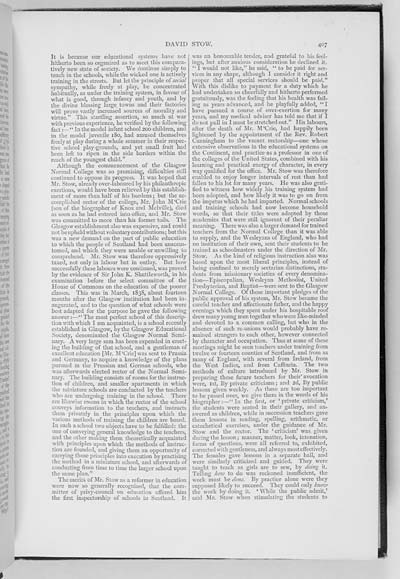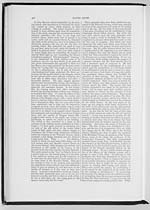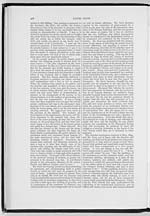Volume 3 > Half-Volume 6
(53) Page 407
Download files
Individual page:
Thumbnail gallery: Grid view | List view

407 It is because our educational systems have not hitherto been so organized as to meet this compara- tively new state of society. We continue simply to teach in the schools, while the wicked one is actively training in the streets. But let the principle of social sympathy, while freely at play, be concentrated habitually, as under the training system, in favour of what is good, through infancy and youth, and by the divine blessing large towns and their factories will prove vastly increased sources of morality and virtue." This startling assertion, so much at war with previous experience, he verified by the following fact:- " In the model infant school 200 children, and in the model juvenile 180, had amused themselves freely at play during a whole summer in their respec- tive school play-grounds, and yet small fruit had been left to ripen in the side borders within the reach of the youngest child." Although the commencement of the Glasgow Normal College was so promising, difficulties still continued to oppose its progress. It was hoped that Mr. Stow, already over-laboured by his philanthropic exertions, would have been relieved by this establish- ment of more than half of his burdens; but the ac- complished rector of the college, Mr. John M'Crie (son of the biographer of Knox and Melville), died as soon as he had entered into office, and Mr. Stow was committed to more than his former toils. The Glasgow establishment also was expensive, and could not be upheld without voluntary contributions; but this was a new demand on the part of public education to which the people of Scotland had been unaccus- tomed, and which they were unable or unwilling to comprehend. Mr. Stow was therefore oppressively taxed, not only in labour but in outlay. But how successfully these labours were continued, was proved by the evidence of Sir John K. Shuttleworth, in his examination before the select committee of the House of Commons on the education of the poorer classes. This was in March, 1838, about fourteen months after the Glasgow institution had been in- augurated, and to the question of what schools were best adapted for the purpose he gave the following answer:�" The most perfect school of this descrip- tion with which I am acquainted, is a school recently established in Glasgow, by the Glasgow Educational Society, denominated the Glasgow Normal Semi- nary. A very large sum has been expended in erect- ing the building of that school, and a gentleman of excellent education [Mr. M'Crie] was sent to Prussia and Germany, to acquire a knowledge of the plans pursued in the Prussian and German schools, who was afterwards elected rector of the Normal Semi- nary. The building consists of rooms for the instruc- tion of children, and smaller apartments in which the miniature schools are conducted by the teachers who are undergoing training in the school. There are likewise rooms in which the rector of the school conveys information to the teachers, and instructs them privately in the principles upon which the various methods of training the children are based. In such a school two objects have to be fulfilled: the one of conveying general knowledge to the teachers, and the other making them theoretically acquainted with principles upon which the methods of instruc- tion are founded, and giving them an opportunity of carrying those principles into execution by practising the method in a miniature school, and afterwards of conducting from time to time the larger school upon the same plan." The merits of Mr. Stow as a reformer in education were now so generally recognized, that the com- mittee of privy-council on education offered him the first inspectorship of schools in Scotland. It was an honourable tender, and grateful to his feel- ings, but after anxious consideration he declined it. "I would not like," he said, "to be paid for ser- vices in any shape, although I consider it right and proper that all special services should be paid." With this dislike to payment for a duty which he had undertaken so cheerfully and hitherto performed gratuitously, was the feeling that his health was fail- ing as years advanced, and he playfully added, "I have pursued a course of over-exertion for many years, and my medical adviser has told me that if I do not pull in I must be stretched out." His labours, after the death of Mr. M'Crie, had happily been lightened by the appointment of the Rev. Robert Cunningham to the vacant rectorship�one whose extensive observations in the educational systems on the Continent, and practice-as a professor in one of the colleges of the United States, combined with his learning and practical energy of character, in every way qualified for the office. Mr. Stow was therefore enabled to enjoy longer intervals of rest than had fallen to his lot for many years. He was also grati- fied to witness how widely his training system had been adopted, and how likely it was to go on from the impetus which he had imparted. Normal schools and training schools had now become household words, so that their titles were adopted by those academies that were still ignorant of their peculiar meaning. There was also a larger demand for trained teachers from the Normal College than it was able to supply, and the Wesleyans of England, who had no institution of their own, sent their students to be trained as schoolmasters under the direction of Mr. Stow. As the kind of religious instruction also was based upon the most liberal principles, instead of being confined to merely sectarian distinctions, stu- dents from missionary societies of every denomina- tion�Episcopalian, Wesleyan Methodist, United Presbyterian, and Baptist�were sent to the Glasgow Normal College. Of those important pledges of the public approval of his system, Mr. Stow became the careful teacher and affectionate father, and the happy evenings which they spent under his hospitable roof drew many young men together who were like-minded and devoted to a common calling, but who in the absence of such re-unions would probably have re- mained strangers to each other, however connected by character and occupation. Thus at some of these meetings might be seen teachers under training from twelve or fourteen counties of Scotland, and from as many of England, with several from Ireland, from the West Indies, and from Caffraria. The two methods of culture introduced by Mr. Stow in preparing these future teachers for their' avocation were, 1st, By private criticisms; and 2d, By public lessons given weekly. As these are too important to be passed over, we give them in the words of his biographer:�"In the first, or 'private criticism,' the students were seated in their gallery, and an- swered as children, while in succession teachers gave them lessons in reading, spelling, arithmetic, or catechetical exercises, under the guidance of Mr. Stow and the rector. The 'criticism' was given during the lesson; manner, matter, look, intonation, forms of questions, were all referred to, exhibited, corrected with gentleness, and always most effectively. The females gave lessons in a separate hall, and were similarly criticized and guided. They were taught to teach as girls are to sew, by doing it. Telling how to do was reckoned insufficient, the work must be done. By practice alone were they supposed likely to succeed. They could only know the work by doing it. ' While the public admit,' said Mr. Stow when stimulating the students to
Set display mode to:
![]() Universal Viewer |
Universal Viewer | ![]() Mirador |
Large image | Transcription
Mirador |
Large image | Transcription
Images and transcriptions on this page, including medium image downloads, may be used under the Creative Commons Attribution 4.0 International Licence unless otherwise stated. ![]()
| Biographical dictionary of eminent Scotsmen > Volume 3 > Half-Volume 6 > (53) Page 407 |
|---|
| Permanent URL | https://digital.nls.uk/74514380 |
|---|---|
| Attribution and copyright: |
|
| Description | Volume III. Contains names alphabetically from Macadam to Young. |
|---|

